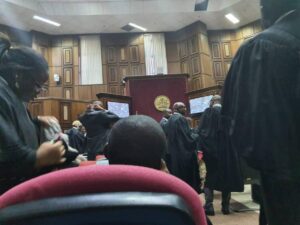African experts recently gathered in Senegal to discuss illicit financial flows (IFFs) and suggest ways of tackling it in the continent.
At the event, Coumba Touré, the Chairperson of TrustAfrica Foundation, said IFFs in excess of $50 billion leave the African continent annually to tax havens.
According to Mr Touré, who spoke at a meeting in Dakar, Senegal, “the money from illicit financial flows is twice as much as the official development aid that Africa receives.”
Also, Ebrima Sali, the Executive Director of TrustAfrica, opined that IFFs played a key role in “depleting the African continent.”
Mr Sali also said there is need for more research into government practices and the effects of the policies that are being adopted to mitigate IFFs.
He said the struggle against IFFs needs to be taken beyond the African continent as IFFs are a global phenomenon.
The Director of Research and Planning at GIABA, Mu’azu Umaru, said that there is a “lack of agreement across board as to what constitutes IFFs.”
He also said “the amount involved when it comes to IFFs are very staggering and often difficult to track and trace. Where the funds are traced, repatriation of the funds have proved very difficult.”
Mr Umaru said mobilising political actors to fight against IFFs is a herculean task; and that multinational companies closely associated with politically exposed persons are very much implicated in the generation, transfer and sharing of IFFs.
He said bringing down top executives of private companies has negative consequences especially on the business.
In his opinion, the realities of IFF can only be understood on a case by case basis.
In the same vein, Oladipo Johnson of CoDA said that Africa loses more in IFFs to countries than it gains from development aid from the same countries.
Staggering losses
Mr Johnson pointed out that although the Mbeki High-Level Panel report shows that up to $50 billion is lost annually in Africa, the reality is that from more recent studies, the figures have gone up to a $100 billion.
Representing the Senegalese Minister of Economy, Finance and Planning at the meeting, Oumar Diallo said repatriation of the proceeds of IFFs to countries was still a major issue. He also spoke on building the capacity of institutions and the need for the private sector and civil society to support governments in the IFFs fight.
<img data-attachment-id="322146" data-orig-file="https://media.premiumtimesng.com/wp-content/files/2019/03/Trust_Africa.jpg" data-orig-size="2048,1536" data-comments-opened="1" data-image-meta="{"aperture":"0","credit":"","camera":"","caption":"","created_timestamp":"0","copyright":"","focal_length":"0","iso":"0","shutter_speed":"0","title":"","orientation":"0"}" data-image-title="Trust_Africa" data-image-description="
Africa loses more in IFFs than it gains from development aid – Experts. [PHOTO CREDIT: Official twitter handle of Amandine Irigoga]
” data-medium-file=”https://i1.wp.com/media.premiumtimesng.com/wp-content/files/2019/03/Trust_Africa.jpg?fit=465%2C349&ssl=1″ data-large-file=”https://i1.wp.com/media.premiumtimesng.com/wp-content/files/2019/03/Trust_Africa.jpg?fit=604%2C453&ssl=1″ src=”https://onlinenigeria.com/wp-content/uploads/2019/03/africa-loses-more-in-iffs-than-it-gains-from-development-aid-experts.jpg” width=”298″ height=”224″ data-original-width=”298″ data-original-height=”224″ itemprop=”http://schema.org/image” title=”Trust_Africa” alt=”Africa loses more in IFFs than it gains from development aid – Experts. [PHOTO CREDIT: Official twitter handle of Amandine Irigoga]”>
Case studies from Mali, Senegal, Central Africa Republic, Nigeria, Ghana and Liberia were presented to give a picture of the state of IFFs in the West African region.
The various existing civil society engagement and advocacy efforts to tackle IFFs in Africa and Research papers were also presented.
The meeting which held March 12-13 focused on ‘Winning the fight against illicit financial flows from Africa: What is the next step? A special focus on West Africa’. It brought together a cross-section of participants from different African countries, especially ECOWAS states.
It gave participants the opportunity to assess the civil society’s engagement and advocacy to stop illicit financial flows, and strategise on new and existing approaches towards combating illicit financial flows in the West Africa region.
You may be interested

Arsenal Equal Chelsea’s London Derby Feat After 5-1 Win Vs Palace
Webby - December 21, 2024Arsenal equaled Chelsea’s London derby achievement following their 5-1 win against Crystal Palace in Saturday’s Premier League game at Selhurst…

Haaland Backs Guardiola To Turn Man City’s Poor Form Around
Webby - December 21, 2024Erling Haaland had said he and his Manchester City teammates are still backing manager Pep Guardiola to turn the team’s…

PSG To Reignite Interest In Osimhen
Webby - December 21, 2024Paris Saint-Germain have contacted Napoli to discuss signing Victor Osimhen in January, according to reports in France.It is reported that…






















![American Pastor, David Wilson Seen Eating The Box Of Woman Who Isn’t His Wife [Video]](https://onlinenigeria.com/wp-content/uploads/2019/10/american-pastor-david-wilson-seen-eating-the-box-of-woman-who-isnt-his-wife-video-150x150.jpg)









